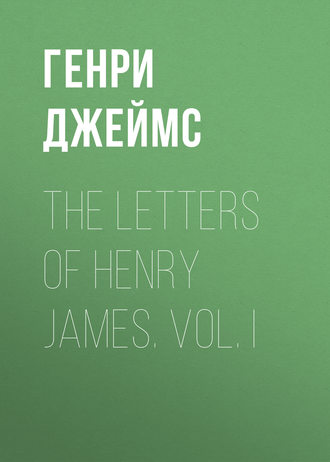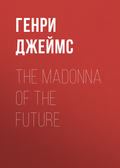
Генри Джеймс
The Letters of Henry James. Vol. I
To his Mother
3 Bolton St., W.January 18th [1879].
My dearest Mother,
I have before me your letter of December 30th, with its account of your Christmas festivities and other agreeable talk, and I endeavour on this 'beastly' winter night, before my carboniferous hearth, to transport myself into the family circle.
Mrs. Kemble has returned to town for the winter—an event in which I always take pleasure, as she is certainly one of the women I know whom I like best. I confess I find people in general very vulgar-minded and superficial—and it is only by a pious fiction, to keep myself going, and keep on the social harness, that I succeed in postulating them as anything else or better. It is therefore a kind of rest and refreshment to see a woman who (extremely annoying as she sometimes is) gives one a positive sense of having a deep, rich, human nature and having cast off all vulgarities. The people of this world seem to me for the most part nothing but surface, and sometimes—oh ye gods! such desperately poor surface! Mrs. Kemble has no organized surface at all; she is like a straight deep cistern without a cover, or even, sometimes, a bucket, into which, as a mode of intercourse, one must tumble with a splash. You mustn't judge her by her indifferent book, which is no more a part of her than a pudding she might make.... Please tell William and Alice that I received a short time since their kind note, written on the eve of their going to Newport, and complimenting me on the first part of the International Episode. You will have read the second part by this time, and I hope that you won't, like many of my friends here (as I partly know and partly suspect,) take it ill of me as against my 'British entertainers.' It seems to me myself that I have been very delicate; but I shall keep off dangerous ground in future. It is an entirely new sensation for them (the people here) to be (at all delicately) ironised or satirised, from the American point of view, and they don't at all relish it. Their conception of the normal in such a relation is that the satire should be all on their side against the Americans; and I suspect that if one were to push this a little further one would find that they are extremely sensitive. But I like them too much and feel too kindly to them to go into the satire-business or even the light-ironical in any case in which it would wound them—even if in such a case I should see my way to it very clearly. Macmillan is just on the point of bringing out Daisy Miller, The International Episode, and Four Meetings in two little big-printed volumes, like those of the Europeans. There is every reason to expect for them a very good success, as Daisy M. has been, as I have told you before, a really quite extraordinary hit. I will send you the new volumes.... Farewell, dearest Mother. I send my filial duty to father, who I hope is worrying comfortably through the winter (I am afraid that since you wrote you have had severe weather)—and looking and listening always for a letter, remain your very lovingest
H. JAMES jr.
To Miss Grace Norton
The 'short novel' he was now just finishing was Confidence
3 Bolton St., W.Sunday a.m., June 8th [1879].
My dear Grace,
It is difficult to talk to you about my impressions—it takes a great deal of space to generalise; and (when one is talking of London) it takes even more to specify! I am afraid also, in truth, that I am living here too long to be an observer—I am sinking into dull British acceptance and conformity. The other day I was talking to a very clever foreigner—a German (if you can admit the "clever")—who had lived a long time in England, and of whom I had asked some opinion. "Oh, I know nothing of the English," he said, "I have lived here too long—twenty years. The first year I really knew a great deal. But I have lost it!" That is getting to be my state of mind and I am sometimes really appalled at the matter of course way of looking at the indigenous life and manners into which I am gradually dropping! I am losing my standard—my charming little standard that I used to think so high; my standard of wit, of grace, of good manners, of vivacity, of urbanity, of intelligence, of what makes an easy and natural style of intercourse! And this in consequence of my having dined out during the past winter 107 times! When I come home you will think me a sad barbarian—I may not even, just at first, appreciate your fine points! You must take that speech about my standard with a grain of salt—but excuse me; I am treating you—a proof of the accusation I have brought against myself—as if you were also a dull-eyed Briton. The truth is I am so fond of London that I can afford to abuse it—and London is on the whole such a fine thing that it can afford to be abused! It has all sorts of superior qualities, but it has also, and English life, generally, and the English character have, a certain number of great plump flourishing uglinesses and drearinesses which offer themselves irresistibly as pin-cushions to criticism and irony. The British mind is so totally un-ironical in relation to itself that this is a perpetual temptation. You will know the things I mean—you will remember them—let that suffice. Non ragioniam di lor!—I don't suppose you will envy me for having dined out 107 times—you will simply wonder what can have induced me to perpetrate such a folly, and how I have survived to tell the tale! I admit that it is enough for the present, and for the rest of the summer I shall take in sail. When the warm weather comes I find London evenings very detestable, and I marvel at the powers of endurance of my fellow "factors," as it is now the fashion to call human beings—(actors—poor blundering unapplauded Comedians would be a better name). Would you like a little gossip? I am afraid I have nothing very lively in hand; but I take what comes uppermost. I am to dine tonight at Sir Frederick Pollock's, to meet one or two of the (more genteel) members of the Comédie Française, who are here just now, playing with immense success and supplying the London world with that invaluable boon, a topic. I mean the whole Comédie is here en masse for six weeks. I have been to see them two or three times and I find their artistic perfection gives one an immense lift out of British air. I took with me one night Mrs. Kemble, who is a great friend of mine and to my sense one of the most interesting and delightful of women. I have a sort of notion you don't like her; but you would if you knew her better. She is to my mind the first woman in London, and is moreover one of the consolations of my life. Another night I had with me a person whom it would divert you to know—a certain Mrs. Greville (a cousin, by marriage, of the Greville Papers:) the queerest creature living, but a mixture of the ridiculous and the amiable in which the amiable preponderates. She is crazy, stage-struck, scatter-brained, what the French call extravagante; but I can't praise her better than by saying that though she is on the whole the greatest fool I have ever known, I like her very much and get on with her most easily.... I am just finishing a short novel which will appear presently in six numbers of Scribner. This is to say please don't read it in that puerile periodical (where its appearance is due to—what you will be glad to hear—large pecuniary inducements,) but wait till it comes out as a book. It is worth being read in that shape. I have asked you no questions—yet I have finished my letter. Let my blessing, my tender good wishes and affectionate assurances of every kind stand instead of them. Divide these with Charles, with your mother, with the children, and believe me, dear Grace, always very faithfully yours,
H. JAMES jr.
To W. D. Howells
H.J.'s forthcoming story in the Cornhill was Washington Square
3 Bolton Street, W.Jan. 31st [1880].
My dear Howells,
Your letter of Jan. 19th and its enclosure (your review of my Hawthorne) came to me last night, and I must thank you without delay for each of them....
Your review of my book is very handsome and friendly and commands my liveliest gratitude. Of course your graceful strictures seem to yourself more valid than they do to me. The little book was a tolerably deliberate and meditated performance, and I should be prepared to do battle for most of the convictions expressed. It is quite true I use the word provincial too many times—I hated myself for't, even while I did it (just as I overdo the epithet "dusky.") But I don't at all agree f with you in thinking that "if it is not provincial for an Englishman to be English, a Frenchman French, etc., so it is not provincial for an American to be American." So it is not provincial for a Russian, an Australian, a Portuguese, a Dane, a Laplander, to savour of their respective countries: that would be where the argument would land you. I think it is extremely provincial for a Russian to be very Russian, a Portuguese very Portuguese; for the simple reason that certain national types are essentially and intrinsically provincial. I sympathize even less with your protest against the idea that it takes an old civilization to set a novelist in motion—a proposition that seems to me so true as to be a truism. It is on manners, customs, usages, habits, forms, upon all these things matured and established, that a novelist lives—they are the very stuff his work is made of; and in saying that in the absence of those "dreary and worn-out paraphernalia" which I enumerate as being wanting in American society, "we have simply the whole of human life left," you beg (to my sense) the question. I should say we had just so much less of it as these same "paraphernalia" represent, and I think they represent an enormous quantity of it. I shall feel refuted only when we have produced (setting the present high company—yourself and me—for obvious reasons apart) a gentleman who strikes me as a novelist—as belonging to the company of Balzac and Thackeray. Of course, in the absence of this godsend, it is but a harmless amusement that we should reason about it, and maintain that if right were right he should already be here. I will freely admit that such a genius will get on only by agreeing with your view of the case—to do something great he must feel as you feel about it. But then I doubt whether such a genius—a man of the faculty of Balzac and Thackeray—could agree with you! When he does I will lie flat on my stomach and do him homage—in the very centre of the contributor's club, or on the threshold of the magazine, or in any public place you may appoint!—But I didn't mean to wrangle with you—I meant only to thank you and to express my sense of how happily you turn those things.—I am greatly amused at your picture of the contributing blood-hounds whom you are holding in check. I wish immensely that you would let them fly at me—though there is no reason, certainly, that the decent public should be bespattered, periodically, with my gore. However my tender (or rather my very tough) flesh is prescient already of the Higginsonian fangs. Happy man, to be going, like that, to see your plays acted. It is a sensation I am dying (though not as yet trying) to cultivate. What a tremendous quantity of work you must get through in these years! I am impatient for the next Atlantic. What is your Cornhill novel about? I am to precede it with a poorish story in three numbers—a tale purely American, the writing of which made me feel acutely the want of the "paraphernalia." I must add, however (to return for a moment to this), that I applaud and esteem you highly for not feeling it; i.e. the want. You are certainly right—magnificently and heroically right—to do so, and on the day you make your readers—I mean the readers who know and appreciate the paraphernalia—do the same, you will be the American Balzac. That's a great mission—go in for it! Wherever you go, receive, and distribute among your wife and children, the blessing of yours ever,
H. JAMES jr.
To Charles Eliot Norton
3 Bolton Street, W.Nov. 13th, 1880.
My dear Charles,
I wish you could take a good holiday and spend it in these countries. I have got to feel like such an old European that I could almost pretend to help to do you the honours. I am at least now a thoroughly naturalised Londoner—a cockney "convaincu." I am attached to London in spite of the long list of reasons why I should not be; I think it on the whole the best point of view in the world. There are times when the fog, the smoke, the universal uncleanness, the combined unwieldiness and flatness of much of the social life—these and many other matters—overwhelm the spirit and fill it with a yearning for other climes; but nevertheless one reverts, one sticks, one abides, one even cherishes! Considering that I lose all patience with the English about fifteen times a day, and vow that I renounce them for ever, I get on with them beautifully and love them well. Our dear Vasari, I fear, couldn't have made much of them, and they would have been improved by a slight infusion of the Florentine spirit; but for all that they are, for me, the great race—even at this hour of their possible decline. Taking them altogether they are more complete than other folk, more largely nourished, deeper, denser, stronger. I think it takes more to make an Englishman, on the whole, than to make anyone else—and I say this with a consciousness of all that often seems to me to have been left out of their composition. But the question is interminable, and idle into the bargain. I am passing a quiet autumn. London has not yet waked up from the stagnation that belongs to this period. The only incident of consequence that has lately occurred to me was my dining a few days since at the Guildhall, at the big scrambling banquet which the Lord Mayor gives on the 9th November to the Cabinet, foreign ministers, etc. It was uncomfortable but amusing—you have probably done it yourself. I met Lowell there, whom I see, besides, with tolerable frequency. He is just back from a visit to Scotland which he appears to have enjoyed, including a speech-making at Edinburgh. He gets on here, I think, very smoothly and happily; for though he is critical in the gross, he is not in the detail, and takes things with a sort of boyish simplicity. He is universally liked and appreciated, his talk enjoyed (as well it may be, after some of their own!) and his poor long-suffering wife is doing very well. I therefore hope he will be left undisturbed by Garfield to enjoy the fruition of the long period of discomfort he has passed through. It will be in the highest degree indecent to remove him; though I wish he had a pair of secretaries that ministered a little more to the idea of American brilliancy. Lowell has to do that quite by himself....
Believe me always faithfully yours,
H. JAMES jr.
To his Mother
Mentmore, Leighton Buzzard,November 28th, 1880.
Dearest mammy,
This is a pleasant Sunday, and I have been spending it (from yesterday evening) in a very pleasant place. 'Pleasant' is indeed rather an odd term to apply to this gorgeous residence, and the manner of life which prevails in it; but it is that as well as other things beside. Lady Rosebery (it is her enviable dwelling) asked me down here a week ago, and I stop till tomorrow a.m. There are several people here, but no one very important, save John Bright and Lord Northbrook, the last Liberal Viceroy of India. Millais, the painter, has been here for a part of the day, and I took a walk [with him] this afternoon back from the stables, where we had been to see three winners of the Derby trotted out in succession. This will give you an idea of the scale of Mentmore, where everything is magnificent. The house is a huge modern palace, filled with wonderful objects accumulated by the late Sir Meyer de Rothschild, Lady R.'s father. All of them are precious and many are exquisite, and their general Rothschild-ish splendour is only equalled by their profusion....
I have spent a good part of the time in listening to the conversation of John Bright, whom, though I constantly see him at the Reform Club, I had never met before. He has the repute of being often "grumpy"; but on this occasion he has been in extremely good form and has discoursed uninterruptedly and pleasantly. He gives one an impression of sturdy, honest, vigorous, English middle-class liberalism, accompanied by a certain infusion of genius, which helps one to understand how his name has become the great rallying-point of that sentiment. He reminds me a good deal of a superior New Englander—with a fatter, damper nature, however, than theirs.... They are at afternoon tea downstairs in a vast, gorgeous hall, where an upper gallery looks down like the colonnade in Paul Veronese's pictures, and the chairs are all golden thrones, belonging to ancient Doges of Venice. I have retired from the glittering scene, to meditate by my bedroom fire on the fleeting character of earthly possessions, and to commune with my mammy, until a supreme being in the shape of a dumb footman arrives, to ventilate my shirt and turn my stockings inside out (the beautiful red ones imparted by Alice—which he must admire so much, though he doesn't venture to show it,) preparatory to my dressing for dinner. Tomorrow I return to London and to my personal occupation, always doubly valued after 48 hours passed among ces gens-ci, whose chief effect upon me is to sharpen my desire to distinguish myself by personal achievement, of however limited a character. It is the only answer one can make to their atrocious good fortune. Lord Rosebery, however, with youth, cleverness, a delightful face, a happy character, a Rothschild wife of numberless millions to distinguish and demoralize him, wears them with such tact and bonhomie that you almost forgive him. He is extremely nice with Bright, draws him out, defers to him etc., with a delicacy rare in an Englishman. But, after all, there is much to say—more than can be said in a letter—about one's relations with these people. You may be interested, by the way, to know that Lord R. said this morning at lunch that his ideal of the happy life was that of Cambridge, Mass., "living like Longfellow." You may imagine that at this the company looked awfully vague, and I thought of proposing to him to exchange Mentmore for 20 Quincy Street.
I have little other personal news than this, which I have given you in some detail, for entertainment's sake.... I embrace you, dearest mother, and also your two companions.
Ever your fondestH. JAMES jr.
To Mrs. Fanny Kemble
Hôtel de la Ville, Milan.March 24th, '81.
My dear Mrs. Kemble,
Your good letter of nearly four weeks ago lies before me—where it has been lying for some days past—making me think of you so much that I ended by feeling as if I had answered it. On reflection I see that I haven't, however—that is, not in any way that you will appreciate. Shall you appreciate a letter from Milan on a day blustering and hateful as any you yourself can lately have been visited with? I have been spending the last eight days at this place, but I take myself off—for southern parts—to-morrow; so that by waiting a little I might have sent you a little more of the genuine breath of Italy. But I can do that—and I shall do it—at any rate, and meanwhile let my Milanese news go for what it is worth. You see I travel very deliberately, as I started for Rome six weeks ago, and I have only got thus far. My slowness has had various causes; among others my not being in a particular hurry to join the little nest of my compatriots (and yours) who cluster about the Piazza di Spagna. I have enjoyed the independence of lingering in places where I had no visits to pay—and this indeed has been the only charm of Milan, which has seemed prosaic and winterish, as if it were on the wrong side of the Alps. I have written a good deal (not letters), and seen that mouldering old fresco of Leonardo, which is so magnificent in its ruin, and the lovely young Raphael in the Brera (the Sposalizio) which is still so fresh and juvenile, and Lucrezia Borgia's straw-coloured lock of hair at the Ambrosian Library, and several other small and great curiosities. I have kept pretty well out of the Cathedral, as the chill of Dante's frozen circle abides within it, and I have had a sore throat ever since I left soft San Remo. On the other hand I have also been to the Scala, which is a mighty theatre, and where I heard Der Freyschütz done à l'italienne, and sat through about an hour and three quarters of a ballet which was to last three. The Italians, truly, are eternal children. They paid infinitely more attention to the ballet than to the opera, and followed with breathless attention, and an air of the most serious credulity, the interminable adventures of a danseuse who went through every possible alternation of human experience on the points of her toes. The more I see of them the more struck I am with their having no sense of the ridiculous.
It must have been at Marseilles, I think, that I wrote you before; so that there is an hiatus in my biography to fill up. I went from Marseilles to Nice, which I found more than usually detestable, and pervaded, to an intolerable pitch, with a bad French carnival, which set me on the road again till I reached San Remo, which you may know, and which if you don't you ought to. I spent more than a fortnight there, among the olives and the oranges, between a big yellow sun and a bright blue sea. The walks and drives are lovely, and in the course of one of them (a drive) I called upon our friends the George Howards, who have been wintering at Bordighera, a few miles away. But he was away in England getting himself elected to Parliament (you may have heard that he has just been returned for East Cumberland,) and she was away with him, helping him. The idea of leaving the oranges and olives for that! I saw, however, a most delightful little maid, their eldest daughter, of about 15, who had a mixture of shyness and frankness, the softness of the papa and the decision of the mother, with which I quite fell in love. I didn't fall in love with Mrs. William Morris, the strange, pale, livid, gaunt, silent, and yet in a manner graceful and picturesque, wife of the poet and paper-maker, who is spending the winter with the Howards; though doubtless she too has her merits. She has, for instance, wonderful aesthetic hair. From San Remo I came along the rest of the coast to Genoa, not by carriage however, as I might have done, for I was rather afraid of three days "on end" of my own society: that is, not on end, but sitting down. When I am tired of myself in common situations I can get up and walk away; so, in a word, I came in the train, and the train came in a tunnel—for it was almost all one—for five or six hours. I have been going to Venice—but it is so cold and blustering that I think to-morrow, when I depart from this place, the idea of reaching the southernmost point will get the better of me, and I shall make straight for Rome. I will write you from there—where I first beheld you: that is, familiarity (if I may be allowed the expression). Enough meanwhile about myself, my intentions and delays: let me hear, or at least let me ask, about your own circumstances and propensities.... You must have felt spattered, like all the world, with the blood of the poor Russian Czar! Aren't you glad you are not an Empress? But you are. God save your Majesty!—Mrs. Greville sent me Swinburne's complicated dirge upon her poor simple mother, and I thought it wanting in all the qualities that one liked in Mrs T. I should like very much to send a tender message to Mrs Gordon: indefinite—but very tender! To you I am both tender and definite (save when I cross).
Ever very faithfully yours,H. JAMES jr.







